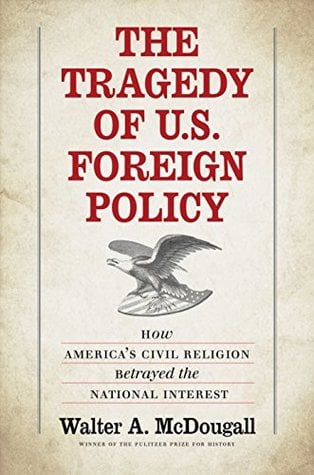Historians of our day have long debated whether ideas or interests are the prime drivers of human decisions. The Hegelian school, which includes neoconservatives and neoliberals, believes the answer is ideas—freedom, democracy, and equality. Marxists say material interests alone. We may dismiss both groups as crude simplifiers. What’s more, the debate ignores what from a classical Christian standpoint is the strongest motivator of all: passions, of which post-Christian, rationalist culture knows nothing. The historian John Lukacs, who has written extensively on the subject, argues for a theory of ideas that is part instrumental, part psychological: “People do not have ideas: they choose them.” If Lukacs is right, then it was not ideas that betrayed the nation; it was men. But how could it be otherwise? Ideas have no moral agency.
Yet it is a peculiar feature of America’s messianic civic religion that its presidents have claimed, at least since Lincoln, to have been mere instruments in the hands of God (or Providence or History). It was not they who willed any given war, but God. Yet every American war, with the exception of the frontier wars with the Indians (and perhaps the war with Japan), has been a war of choice. Of all the wars America has fought, how many were in the interest of the nation? I count only one: the war with Mexico.
Notice how our presidents have cloaked their claims of divine inspiration, invoking America’s “ideals,” “values,” and her “mission,” as if these things compelled them to send in the Marines, begin the bombing, or topple a regime. So it is easy to make the mistake of believing that it was bad ideas that ruined us rather than bad men. Lukacs again: “what men do to ideas is both more important and more real than what ideas do to men.” And the men who matter here are the men making the decisions, not those whose sole political act is to cast a vote. Lukacs’s theory of ideas helps us understand how American leaders have consistently ignored or violated the very principles they have claimed as justification for their wars. Hypocrisy is the essence of a Pharisee, and the American civic religion is nothing if not pharisaical.
Please do not think that I am dismissing Walter McDougall’s fine book. I object only to the subtitle. Substituting the phrase “Secular Priests” for “Civic Religion” would not only satisfy my criticism but make for a more faithful representation of the author’s arguments. (He describes President Franklin Roosevelt as a “failed high priest.”)
McDougall considers the American civic religion on the basis of classic continentalism, progressive imperialism, and millennial globalism. The first extended from the founding of the republic to the 1890’s; the second, from the Spanish-American War through the end of the Cold War; and the third, from the Persian Gulf War to the present day. All three have been contested, occasionally eclipsed, by populist resistance, but none has been overcome; rather, each was succeeded by a more militant and messianic version of itself. Civic religion, McDougall argues, is “always in more or less flux because each generation must re-imagine the national God who blesses whatever foreign policy posture Americans, or at least their elites, believe the times demand.” The consistent thread is the conceit that America is God’s chosen nation entrusted with a special dispensation to remake the world in her own image, whatever that image may be. The latest manifestation of this delusion is the perverse project to remake the nation in the image of the world. McDougall calls it “Obama’s world.” America, having abolished herself, must be reborn as a world state living under a global civic religion. To our secular priests in the media and the political class, Trump’s “America First” is heresy.
American elites, beginning with the Spanish-American War in 1898 and continuing through the buildup to the invasion of Iraq in 2002, have used civic religion to justify and to hide their imperial ambitions. Thus, they created a special kind of empire, one that refuses to reveal itself. I see no evidence, either in my own studies or in McDougall’s text, that ordinary Americans (those who work and fight as opposed to those who talk and plan) have ever sincerely believed the rhetorical balderdash and humanitarian cant that Wilson, the two Roosevelts, President Clinton, and the Bushes have uttered to justify their endless wars and interventions abroad. What Americans themselves believed or wanted has counted for very little.
Until, perhaps, now. President Trump’s upset victory last year represents a populist repudiation of the globalist phase of America’s civic religion, and a possible turning point in the nation’s history.
[The Tragedy of U.S. Foreign Policy: How America’s Civic Religion Betrayed the National Interest, by Walter A. McDougall (New Haven, CT: Yale University Press) 408 pp., $30.00]

Leave a Reply